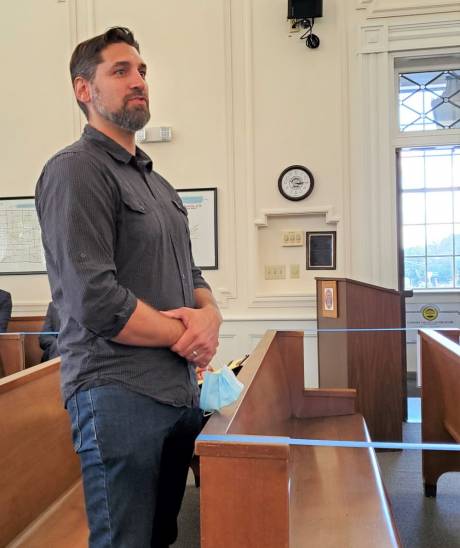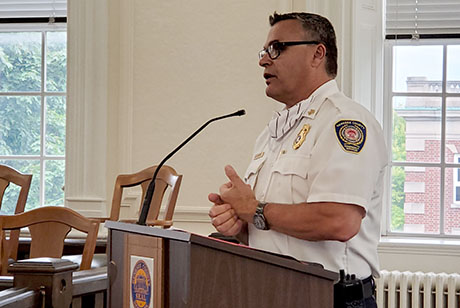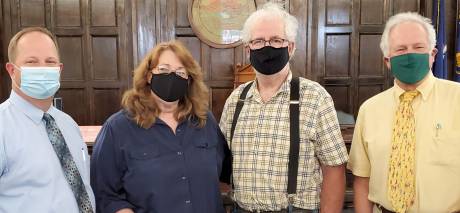After living and working in six different cities in six different states over a 19-year period, the Jay Gsell family rolled into Batavia in 1993 with the head of the household in contention for the vacant Genesee County manager’s job.
Twenty-seven years later, and just five days away from completing a distinguished career as the county’s chief administrative officer, Gsell recalls with clarity the 48 hours that resulted in his hiring to succeed Charles Meyer, who had served 11 years as Genesee’s first county manager.
“We had been three years, which seemed like six, in Marshalltown, Iowa, and then there was a conscious decision by my wife (Ann Marie) and I that we wanted to come back east, because we’re both from New Jersey and I felt more comfortable in that setting,” he said.
“Obviously, our daughter (Claire) was just getting ready to go into middle school and we wanted to go somewhere and stay long enough to get her through high school. And, lo and behold, we’re still here.”
Gsell is retiring on Friday – the day before his 69th birthday.
Looking back, he said he had applied for a number of jobs, interviewed for a couple and turned down one or two prior to setting his sights on Genesee County.
“I think there were 70 candidates and they cut it down to 10 finalists, and then the 10 of us came and were interviewed over a day and a half,” he said. “It was over in the Batavia Club (now GO ART! on East Main Street) by various groups of citizens and legislators and city council people, and that kind of stuff. We went from room to room to be interviewed.”
He said after interviewing, he went back to Iowa and received a call from Carl Perkowski, the county legislative chair.
“I actually was in Des Moines at the time because my wife was doing a regional theater show there,” Gsell said. “He made the offer on the phone, we talked about it and agreed that if it happens, let’s do it.”
The ‘Interloper’ Meets Florence Gioia
The date was on Aug. 13 or 14, Gsell said, and he was at the Old County Courthouse waiting for the legislature to vote.
“I’m upstairs in the legislative chambers and the resolution is there. (The late legislator) Florence Gioia is in the audience, and complaining about where did they find this interloper and carpetbagger, and why couldn’t they find somebody local to be the next county manager,” Gsell recalled. “And so, I’m sitting there over on the side, and after she did her little piece – and she was in that yellow slicker that she always wore – I just raised my hand, and said, ‘Hi, Miss Gioia. I’m that interloper.’ ”
Gsell’s eyes lit up at this point and, while laughing his signature laugh, he added, “And the rest as they say, is history.”
A product of New Jersey (the northern counties of Passaic and Essex), Gsell is the oldest of five and actually is a Junior, although he doesn’t use the Jr. after his name. Just as in the early days of his professional life, he moved around a lot while growing up.
“Every time there was another kid, we moved to another house,” he said.
He graduated from Seton Hall Prep School on the campus of Seton Hall University in South Orange, N.J., and earned a track scholarship to the College of William & Mary in Williamsburg, Va. In fact, he was a scholarship athlete in high school, as an undergraduate and in graduate school, clocking personal best times of 9:02 in the steeplechase (his primary event) and 4:09 in the mile.
Getting ‘On Track’ for a Master’s Degree
Gsell’s success as a runner played a key role in his enrollment at American University, where he earned his master’s degree in public administration in 1974.
“Glenn Wood, a friend of mine who was at that time the world-record holder in the mile in the senior age 40-plus division and a professor at American University, said you ought to come here, we have a good public administration program. So, I said, what does that entail? And then he said we also need an assistant coach for the track and cross-country teams.”
That was enough to persuade Gsell to head for Washington, D.C., where he attended school at night, worked during the day and ran two and a half hours a day with his contemporaries while coaching them as well.
“I did this for 18 months, got my master’s degree and then I set out to try and get a real job,” he said.
Following an internship in Richmond, Va., and a regional government post in the nation’s capital, Gsell took on several real jobs over the next 19 years – starting as a city budget analyst in Trenton, N.J., where he met his wife, and then on to city management roles in North Shores, Mich.; Eau Claire, Wis.; Winchester, Conn.; Cumberland, Md., and Marshalltown, Iowa.
Gsell said that the mindset of municipal government officials at that time was of a nomadic nature.
“I wasn’t probably going to set down my roots in one of those first four or five communities that we lived in and moved to,” he said. “It was my psychosis or my psychology that said, ‘I gotta move; it’s just going to happen.’ ”
No Giving in to Ralph Nader
While in Connecticut, Gsell recalled an interaction with famed political activist/consumer advocate Ralph Nader, who lived in Winchester.
“I met Ralph Nader twice, personally. He came into my office to complain that his old grammar school was being renovated and he didn’t like the way they were doing it,” he said. “He thought that because the school budget was part of the town/city budget, he felt that I could go in and just tell the superintendent and the board of education that you’re not going to do that. I respectfully disagreed with him.
“But it’s interesting that when you walk in and see this icon sitting in your office, I was like, ‘What the heck did I do?’ You genuflect, and ask 'where’s the holy water?' ”
Gsell said that every stop prior to Batavia proved to be a learning experience (he cut his teeth dealing with the media while serving as the assistant city manager in Eau Claire) and he is proud to say that he left each location on his own terms and on good terms.
The Genesee County manager job proved to be his first and only county government position.
“For me, it was a matter if I was going to break the mold of moving frequently, either going to larger governments or on to a different challenge,” he said. “Leaving local government at the town, village and city levels and moving to a county was going to be, for me, somewhat unique. But in hindsight, it was a great move.”
Gsell has made his mark both professionally and as an active member in civic organizations, such as the Rotary Club, United Way, HomeCare & Hospice, Chamber of Commerce. Genesee/Orleans Council on Alcoholism and Substance Abuse, Leadership Genesee and the Genesee Area YMCA.
Finding a Home on Washington Avenue
He and his wife have lived on Washington Avenue in Batavia, not far from the Batavia Middle School, for the entire time.
“We’ve never lived in the same house as long as we have in Batavia, neither of us, even when growing up,” he said. “We must have looked at 18 houses in a day and a half. I think it was the last house we saw. We saw nothing in Le Roy. Everything was either from Stafford, west. As soon as Ann Marie walked in and saw the woodwork and everything else, she said this is the house.”
In time, Jay, Ann Marie and Claire realized that Batavia would be their permanent home.
“I think it was between conversations with my wife and daughter, after Claire graduated from Batavia High in 1999, that it was pretty clear at that point,” he said. “I thought, OK what else is it that I would want to accomplish that I couldn’t do here? It really became then that this would be where we set our roots down.”
Gsell said his son, Christopher, who he had adopted when he was in the third grade, had moved out to California to spend some time with his biological father. Today, Christopher, 45, is chief creative officer for Halo Media LL, and lives in Brooklyn with his wife.
Tragedy struck the family on March 22, 2009, when Claire, passed away at the age of 27.
“She had been working in a pretrial services program in Monroe County toward her goal of becoming a probation officer, and two weeks later (following her death), we got a letter stating that they wanted her to work there in that capacity,” Gsell said. “She really wanted that job. This would have made her day.”
Aa 2003 graduate of the State University of New York at Oswego with a bachelor’s degree in criminal justice, Claire also worked part time at DePaul.
“As my wife always says, ‘Man plans and God laughs,’ ” Gsell said, indicating a strong faith has sustained them in their loss.
Unloading the Nursing Home was a Big One
Reflecting upon his career in Genesee County, Gsell said priorities included adopting “consistent and well-funded budgets that were balanced so we weren’t living on the edge in terms of revenue assumptions” and making wise decisions about county facilities, specifically mentioning the county-owned airport, courts facility and former nursing home.
“We’ve spent almost $30 million at the County Airport, most of which has been federal and state money, and turned that into a Class A reliever airport under the FAA (Federal Aviation Administration) and state guidelines in the regional pattern,” he said. “And we sold the nursing home for $15.2 million to Premier Healthcare to stop the bleeding. Fortunately, Premier is in the business of operating nursing homes. It still is the owner and they own the one in Le Roy, too.”
He said the county had been operating the nursing home at an average annual deficit of about $2 million for eight years prior to unloading it in 2017.
“We used about $5 million of the sale to settle obligations while we still owned the facility,” he said. “As far as profit, not even close as the nursing home owed money to the county’s general fund.”
Gsell said the 52,000-square-foot, two-story Genesee County Court Facility on Ellicott Street (across from his office on the lower floor of the Old Courthouse) has served its purpose, but he wishes it had two more stories.
“If that were the case, it would have been city and county law enforcement with dispatch on the first floor and you go up from there,” he said. “All criminal justice would have been located in one place, and we would have had more storage in the building. I guess that constraints at the time were such that it just wasn’t in the cards.”
Gsell: City Police Should Be on Park Road
Gsell also said that the City of Batavia should have partnered with the county about 10 years ago on what is now the county sheriff’s office on Park Road.
“We tried numerous times to pull that off. We spent a lot of time going back and forth – where to locate it. Just for the sheriff’s administration building, we were all over the City of Batavia, looking at various sites, working with consultants as to where to put the two together,” he said. “As it turns out, we at least accomplished consolidated dispatch, which even to this day is not universal in the State of New York as far as counties and relatively larger cities.”
He said about 20 sites, all inside the city, were considered for a combined city/sheriff’s police building.
“Finally, the county, seeing the reluctance from the city, had to do something. As it turned out, we worked with the city and the VA Medical Center to use the Park Road site because the city actually owned that property, which was within the city limits,” he explained. “That was one of the opportunities that was missed -- for us to put our two law enforcement entities completely together.”
Gsell said much progress has been made in bringing water to the county, through a long-standing agreement with the Monroe County Water Authority and recent connections with the Erie County Water Authority; in the area of shared services with towns and neighboring counties; and on a new state-mandated county jail that has been “paused” by the coronavirus pandemic.
“We were ready to put that sucker out for bid late last year and all of a sudden COVID-19,” he said. “Now, we’re exploring a joint jail with Orleans County, which would need approval from the state legislature. The need is not any less -- it’s the ability to determine what the right size is as well as where the financing will come from because our sales tax has taken such a hit.”
He’s Known as ‘The Dean’ to His Colleagues
Gsell said his job has been made much easier over the years thanks to consistently strong legislatures and the constant communication with other county managers and administrators throughout the state.
“We’ve always had very good legislators … good people to work with,” he said. “Plus, I am thankful to have made close friends with colleagues; people who rely on each other and network with each other every day.”
One of those people is Shaun Groden, Greene County administrator and president of the New York State Association of County Administrators and Managers.
“Jay is the dean of New York State county managers, partially from his tenure but primarily through his expertise,” Groden said. “He always is able to dissect the issue, and he has a rabid sense of humor, too.”
Groden said administrators seek feedback and advice from one another via a listserv (electronic mailing list), and all value Gsell’s opinions.
“Jay would often add his two cents and it was typically humorous as well as insightful,” he said. “Just the other week, his response was both comedic and right on point. I am going to miss these comments.”
A Trip to Italy; Remembering Barber Conable
At the end of this work week, Gsell will turn the managerial reins over to Matt Landers, his assistant for the past six years. He said he is leaving the county in good hands.
“It’s what our legislative body and our team here is all about – a very professional local government organization that respects tenure as far as employees are concerned, understands the serious nature of what it is we do … and as far as the succession process, we try to build that into a lot of our departments so when an opportunity occurs, we can promote from within,” he offered.
Gsell said he will continue to stay involved in the community and that he and Ann Marie may do some traveling once coronavirus-related restrictions are eased.
“Ann’s only family is her nephew, Brian, down on the Jersey Shore. He’s about the only person we could go visit right now. My siblings are in North Carolina or Virginia, and we can’t go see them right now,” he said. “My other sister lives in Michigan with her husband and three kids.”
He said his wife wants to go back to Italy. “She’s 110-percent Italian,” he quipped.
“Ann Marie has been all over the place when she worked as the first female tech for Dow Jones, making sure the ticker tape machines were working at the brokerages,” he said. “Me, I’ve been to Canada, that’s it.”
Travel plans aside, he says he takes great satisfaction in completing the task before him and being able to forge so many lasting relationships. And he considers himself blessed to have met a particular congressman who was born in the Wyoming County Village of Warsaw and lived in the Genesee County Village of Alexander.
“The fact that I got to meet the real Barber Conable, up close and personal, to me was at the top of my list, all things considered,” he said. “When I was in high school that’s when he was at his ascendancy in the Congress – the most respected congressperson of that era in Washington, D.C., during Watergate.
“Who gets to call that part of their legacy? Barber was it. I met him in that Saturday morning coffee klatch over at Karl Buchholtz’s place (Genesee Hardware) on Ellicott Street, and I was thinking to myself, ‘Holy crap, Barber Conable! Really, really?’ That’s almost as good as my Lou Holtz (head football coach at the College of William & Mary from 1969-71) moment.”
At top, photo by Genesee County Chamber of Commerce; Gsell in his office at the Old County Courthouse, photo by Howard Owens; Gsell (in back row, second from the right) as a freshman member of The College of William & Mary track team, submitted photo.







